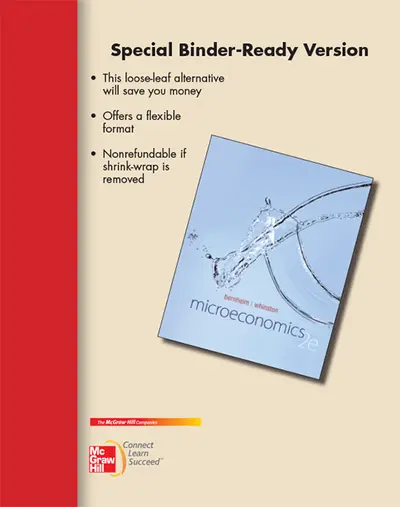My Account Details

ISBN10: 0077491866 | ISBN13: 9780077491864

Microeconomics, 2nd Edition
Loose-Leaf Purchase
Unbound loose-leaf version of full text
Shipping Options
- Standard
- Next-day air
- 2nd-day air
Orders within the United States are shipped via FedEx or UPS Ground. For shipments to locations outside of the U.S., only standard shipping is available. All shipping options assume the product is available and that processing an order takes 24 to 48 hours prior to shipping.
Hardcopy
Complete text bound in hardcover or softcover
Shipping Options
- Standard
- Next-day air
- 2nd-day air
Orders within the United States are shipped via FedEx or UPS Ground. For shipments to locations outside of the U.S., only standard shipping is available. All shipping options assume the product is available and that processing an order takes 24 to 48 hours prior to shipping.
Loose-Leaf Purchase
Details:
- Unbound loose-leaf version of full text
Hardcopy
* The estimated amount of time this product will be on the market is based on a number of factors, including faculty input to instructional design and the prior revision cycle and updates to academic research-which typically results in a revision cycle ranging from every two to four years for this product. Pricing subject to change at any time.
Bernheim and Whinston's Microeconomics 2nd edition is uniquely designed to appeal to a variety of student learning styles. The content focuses on core principles of the intermediate microeconomics course: individuals and firms making decisions, competitive markets, and market failures, and is delivered in a combination of print, digital, and mobile formats appropriate for today's learner. McGraw-Hill's adaptive learning component, LearnSmart, provides assignable modules that help students master core concepts in each chapter. Scan codes within the chapters give students mobile access to online resources including videos on how to solve In-Text Exercises. Extensive end-of-chapter material provides flexible options for both calculus and algebra-based courses. Bernheim and Whinston's completely integrated and accessible learning experience teaches students to apply and engage with a wide range of quantitative problems for more success in the intermediate microeconomics course.
1. Introduction
2. Supply and Demand
3. Balancing Benefits and Costs
4. Consumer Preferences
5. Constraints, Choices, and Demand
6. Demand and Welfare
7. Technology and Production
8. Cost
9. Profit Maximization
10. Choices Involving Time
11. Choices involving Risk
12. Choices Involving Strategy
13. Behavioral Economics
14. Equilibrium and Efficiency
15. Market Intervention
16. General Equilibrium, Efficiency, and Equity
17. Monopoly
18. Pricing Policies
19. Oligopoly
20. Externalities and Public Goods
21. Asymmetric Information
About the Author
B. Douglas Bernheim
B. Douglas Bernheim graduated with an A.B. in Economics from Harvard University, summa cum laude and Phi Beta Kappa, in 1979. He entered graduate study at M.I.T. under a National Science Foundation Graduate Fellowship and completed his Ph.D. three years later. He began his academic career at Stanford University and taught there from 1982 to 1987. He left Stanford in 1988 to assume an endowed chair in the Department of Finance at Northwestern University’s J.L. Kellogg Graduate School of Management. In 1990 he moved to Princeton University, where he held an endowed chair in the Department of Economics and also served as the co-director of the Center for Economic Policy Studies. He returned to Stanford in 1994 and is now the Edward Ames Edmonds Professor of Economics. Professor Bernheim’s work has spanned a number of fields, including public economics, political economy, game theory, contract theory, behavioural economics, industrial organization, and financial economics. He is a research associate of the National Bureau of Economic Research, a Senior Fellow of the Stanford Institute for Economic Policy Research (SIEPR), and co-director of SIEPR’s Tax and Budget Policy Program. He is also a former director of the Stanford Institute for Theoretical Economics and co-editor of the American Economic Review. Professor Bernheim’s teaching has included principles of economics, intermediate microeconomics, public economics, microeconomic theory, industrial organization, behavioural economics, and insurance and risk management.
Michael Whinston
Michael D. Whinston is the Robert E. and Emily H. King Professor of Business Institutions in the Department of Economics at Northwestern University. He also holds appointments at Northwestern’s School of Law and its Kellogg Graduate School of Management. Whinston received his B.S. and M.B.A. from the Wharton School at the University of Pennsylvania and his Ph.D. from M.I.T. He taught at Harvard from 1984 to 1997 before moving to Northwestern. His research has covered a variety of topics in microeconomics, including game theory, the design of contracts and organizations, fi rm behaviour in oligopolistic markets, antitrust, and law and economics. He has also conducted empirical research on the airline and pharmaceutical industries, and served as a consultant—for private parties, the government, and the courts—in various antitrust cases. Whinston is a co-author of the leading graduate textbook in microeconomics, Microeconomic Theory (Oxford University Press, 1995), and is also the author of Lectures on Antitrust Economics (MIT Press, 2006). He and Bernheim have collaborated since 1983, and are excited about this opportunity to produce an innovative new microeconomics text for undergraduates.
Need support? We're here to help - Get real-world support and resources every step of the way.